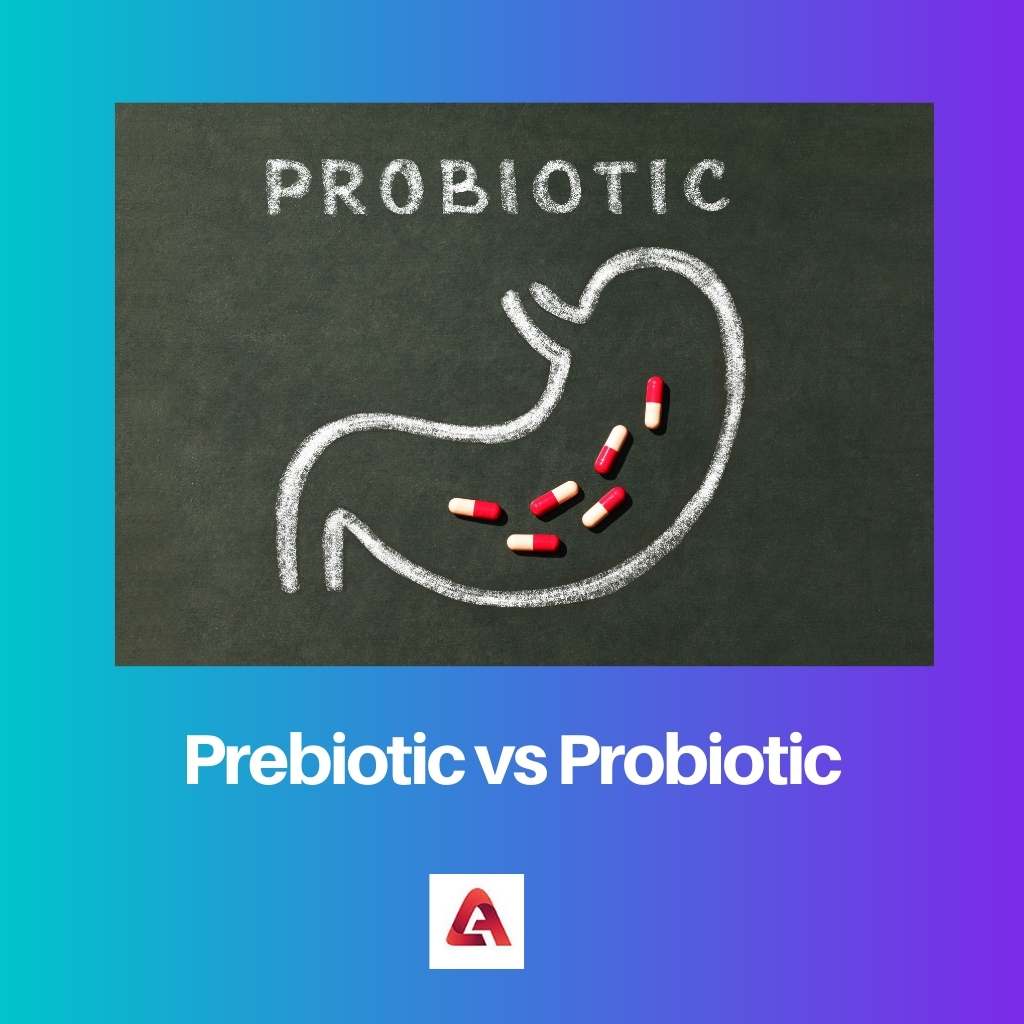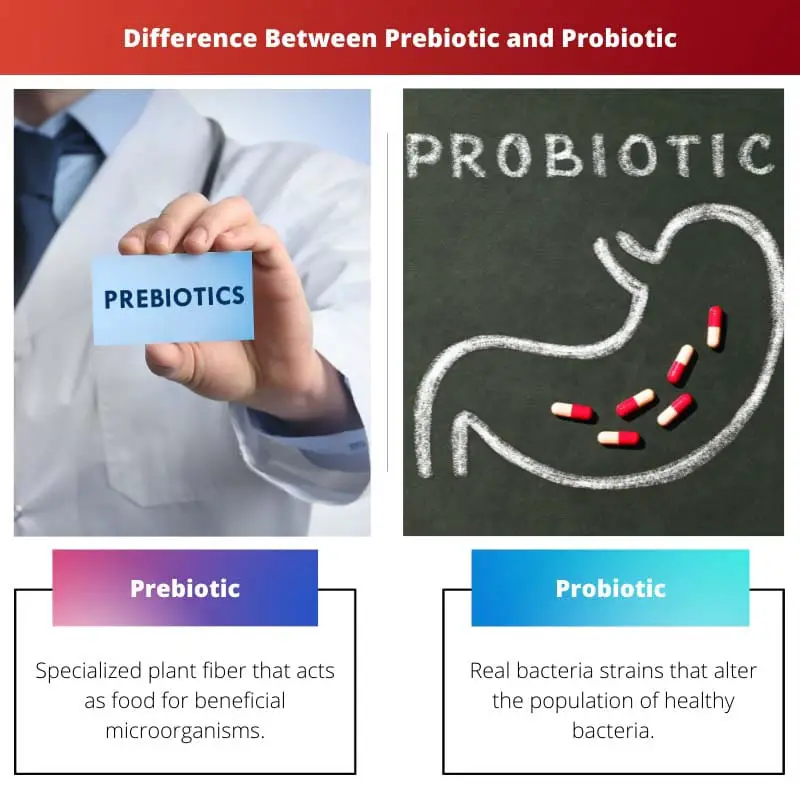Probiotics and prebiotics are both hot subjects in nutrition right now. Despite their similarity in sound, the two perform distinct functions in your health.
Prebiotics are the bacteria’s nourishment, while probiotics are the helpful bacteria. Most of us are likely to mix up probiotics and prebiotics on a regular basis.
However, it’s critical to note that they both affect our gut health differently. These gut microbes are only a few of the trillions that promote digestion, absorb nutrition, and enhance immunity.
Key Takeaways
- Prebiotics are non-digestible fibers that promote the growth of beneficial gut bacteria, while probiotics are live microorganisms that improve gut health when consumed.
- Prebiotics are found in high-fiber foods like fruits, vegetables, and whole grains, whereas probiotics are found in fermented foods such as yogurt, sauerkraut, and kimchi.
- Prebiotics serve as food for probiotics, working together to maintain a healthy balance of gut bacteria and support digestive health.
Prebiotic vs Probiotic
A prebiotic is a plant fiber that serves as a source of food for beneficial microorganisms. It is normally found in beans, asparagus, and barley and is made of carbohydrate fibers. Probiotics are beneficial bacteria that can be received by supplementation or food, and it’s made up of organisms.

Prebiotics are plant fibres that have been genetically modified. They work as fertilizers, encouraging the development of beneficial microorganisms in the stomach.
They can be found in a variety of fruits and vegetables, particularly those high in complex carbs like fibre and resistant starch.
Because our system cannot digest these carbohydrates, they move through the digestive system, becoming food for bacteria and other germs.
Probiotics vary from other supplements in that they include living organisms, particular varieties of bacteria that directly contribute to the abundance of healthy germs in our gut.
The bacteria must have established pro-health benefits in order to be designated as a probiotic. The effectiveness of probiotic health benefits is affected by the kind, dosage, and mode of administration.
Comparison Table
| Parameters of comparison | Prebiotic | Probiotic |
|---|---|---|
| Meaning | Specialized plant fibre that acts as food for beneficial microorganisms | Real bacteria strains that alter the population of healthy bacteria |
| Health Advantage | Reduction of cancer risk, enhanced absorption of calcium, etc., | Lowering the risk or advancement of chronic diseases, reducing allergies, etc., |
| Compounds | Made up of a complex carbohydrate-fibre | Made up of actual organisms |
| Consumption | Our digestive system is incapable of breaking down prebiotics | Probiotics sustain in the gut |
| Found in | Barley, asparagus, beans | Kombucha, yogurt, miso |
What is a Prebiotic?
Prebiotics are dietary ingredients that stimulate the development or activity of helpful microbes such as bacteria and fungi.
Prebiotics are not actual organisms and are not impacted by circumstances in your stomach, such as heat, rot, cold, or acidity. Blueberries, for example, are a delightful form of prebiotic fibre that retains their efficacy even when frozen.
Prebiotics are found in foods that our system cannot process. They provide nourishment for bacteria and other helpful organisms in the gastrointestinal tract.
The advantages of prebiotics are related to the advantages of probiotics.
Prebiotics provide several health advantages, including lower cancer risk, lower LDL cholesterol, enhanced immunity, higher calcium absorption, relief from peptic ulcers, maintaining gut pH, and lowering triglycerides.
People do not need to take prebiotic supplements because they are naturally present in many foods a lot of times. Carbohydrates and natural compounds are the primary sources.
These nutrients may be tough for the body to absorb, but the healthy bacteria in the stomach use them as nourishment. They pass from the small intestine into the colon unprocessed. Probiotics decompose it and use it for energy.
People may guarantee that they get a range of prebiotics that may fuel diverse strains of bacteria by adding a variety of meals to their diet. Prebiotics may be found in a wide variety of high-fibre meals, such as fruits, veggies, and whole grains.
What is a Probiotic?
Probiotics are “healthy” bacteria (also known as living cultures) that you may get through meals or supplementation. They are the same microorganisms that live in our digestive tract.
Probiotics can assist in regulating the population numbers of species of bacteria in your gut, which supports gut health.
Several fermented foods include probiotics. Fermentation is a phenomenon that occurs naturally when bacteria transform sugars and other carbohydrates in meals into acids.
For several individuals, fermented dairy products like yoghurt, kefir, and some aged cheeses are the most prevalent source of probiotics.
Lactobacillus acidophilus, present in yoghurt, is one of the most prevalent kinds of probiotic bacteria living in our intestines.
Probiotics should be able to sustain from the time they are produced till they enter our small intestine in order to deliver health advantages. Certain strains are more heat sensitive and will perish soon if exposed to extreme heat.
Other strains, such as those in the Bacillus genus, are more resistant to severe environmental influences and are regarded as more stable.
Furthermore, many probiotic-containing foods, especially dairy products, might deteriorate if not refrigerated at suitable temperatures.
On the other hand, some shelf-stable probiotics are freeze-dried and packaged in warm and moisture-resistant containers, so they may not need to be refrigerated.
Main Differences Between Prebiotic And Probiotic
- Prebiotics are specialized plant fibre that serves as nourishment for healthy bacteria, and they promote the development of the beneficial bacteria that already exist, whereas probiotics are actual bacteria varieties that change the demographics of healthy bacteria in our digestive tract.
- Prebiotics provide health advantages such as reduction of cancer risk, reduction of LDL cholesterol, strengthening the body’s immune system, enhancing absorption of calcium, and so on, whereas probiotics benefit by lowering the risk or advancement of chronic diseases, managing gastrointestinal disorders, and reducing allergies, among others.
- Prebiotic supplements are made up of complex carbohydrates, such as fibre. Probiotic supplements, on the other hand, include actual organisms. A single dosage may contain a single strain of microbe or a combination of microorganisms.
- Our digestive system cannot break down prebiotics, and they withstand passage through the digestive system. Meanwhile, when we consume probiotics, they sustain in the gut and give us the same advantages that our natural bacteria provide.
- Prebiotic foods include barley, asparagus, beans, apples, bananas etc., whereas probiotic foods include kombucha, yoghurt, miso, kefir, and kimchi etc.,




